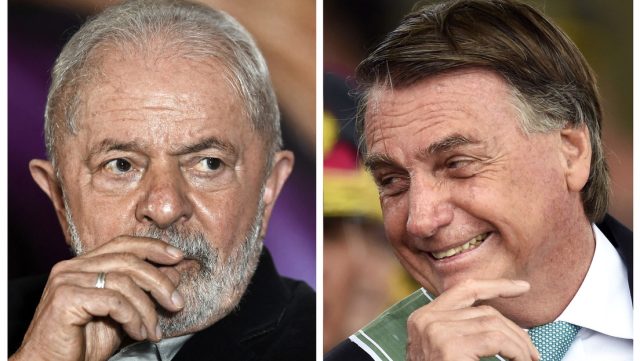The former leftist president Luiz Inácio Lula da Silva, who took the victory in the first round of the Brazilian elections, and the far-right president Jair Bolsonaro, who came out strong after resisting much better than expected, are starting four weeks of a tough political campaign ahead of the 30 October, in which both will exhibit their legacies to win the vote of the two minor candidates, who together add up to 7%, and of the 20% of abstentionists.
Far from being disappointed at not sealing his victory in the first round, as some polls predicted, the patriarch of the Brazilian left, who won 48.43% of the vote, said that the ballot is «an extension, an opportunity» that Brazilians give to him so as to «mature proposals and the dialogue with society».
Lula warned that he will work with his campaign team to convince Brazilians that he is the best option to improve their lives, as he did during his two terms as president (2003-2010), reports RT.
A central figure in Brazilian politics for the last 40 years, Lula left the presidency with record popularity. His government was recognized for economic growth and social programs with which he lifted tens of millions of Brazilians out of poverty thanks to the boom in commodities (raw materials).
“We are going to leave the second round to debate only with him [Bolsonaro]. So that we can measure the Brazil that he built with the Brazil that we built during our governmental period”, affirmed Lula.
And he continued: «We are going to talk to our adversaries, to our friends, to those who think they don’t like us, we are going to convince them that we will be the best option to improve the lives of the Brazilian people».»Desire for Change»
With a surprising vote of 43.20%, almost ten points more than the polls indicated, Bolsonaro acknowledged that there is «a desire for change» in the population, especially due to high inflation.
The president also stressed that he will work to expand his alliances and convince Brazilians that the delicate economic situation in the country is «a consequence of the ‘stay at home’ policy [referring to the time of the pandemic], ‘the economy goes after’, a war abroad and an ideological crisis».
Bolsonaro, 67, was widely criticized for his handling of the pandemic – which left more than 680,000 dead – especially because of his campaign against confinement measures on the grounds that they would excessively damage the economy.
After Sunday’s results, the president launched several criticisms of the institutes that conduct electoral polls. “We beat the lie. They were saying that Lula reached more than 50%», he stressed.Decisive votes for Brazil
Much of the work of Lula and Bolsonaro goes through winning the favor of the third and fourth placed candidates in the first round: the center-right senator Simone Tebet and the center-left Ciro Gomes.
Tebet, 52, gave another surprise by finishing third (4.16%), after beating Gomes (3.04%), who was the big loser. After the results, both asked for time to position themselves for the second round.
Tebet affirmed that, despite the fact that her decision has already been made, she will wait to know the position of the presidents of the parties she represents: the Movimiento Democrático Brasileño (Brazilian Democratic Movement – MDB), the Partido de la Social Democracia Brasileña (Brazilian Social Democracy Party – PSDB), the Partido Ciudadanía (Citizenship Party) and Podemos.
For his part, Gomes, candidate of the Partido Democrático Laborista (Democratic Labor Party – PDT), which has contested four presidential elections (1998, 2002, 2018 and 2022), was «deeply concerned» and demanded «a few hours to talk with his friends and his party». After this, the PDT announced its support for Lula and Gomes accepted that decision.
In 2018, Gomes, who was Lula’s minister and is now a harsh critic, obtained a decisive 12.47% in the first round, but left for Europe before the second round without leaning even towards the PT candidate at the time, Fernando Haddad, nor for Bolsonaro.
Many attribute Bolsonaro’s victory to this fact.A more conservative Brazil
In addition to its good electoral efforts, Bolsonarism made a show of strength in the elections in which the 513 deputies, a third of the senators, the governors, as well as hundreds of state and Federal District deputies were also chosen.
The party chosen by Bolsonaro to contest the election, the Partido Liberal (Liberal Party – PL), registered significant growth in Congress and will have the largest bench in the Chamber of Deputies in its history with 99 deputies.
While, in the Senate, the PL and groups allied with Bolsonaro won 14 of the 27 seats in the running. Four of the elected senators are former ministers of the president, such as the ultra-conservative Damares Alves, minister for women, or Tereza Cristina, head of Agriculture.
Former judge Sergio Moro, who played a leading role in the Lava Jato anti-corruption mega-operation, by which he sentenced Lula to prison, and later become Bolsonaro’s Minister of Justice, won a seat in the Senate.
For its part, the PT, Lula’s formation and in coalition with the Communist Party of Brazil and the Green Party, won 80 deputies, 12 more than in the previous elections.
“Some turbulent weeks await Brazil before the second round on October 30. No matter who wins the presidency, Bolsonarism will be very much alive in Congress and the Senate. If Lula wins, he is likely to face fierce resistance», wrote the political analyst Oliver Stuenkel on Twitter.


